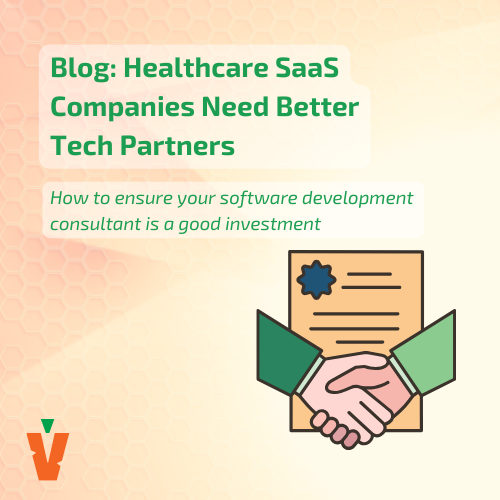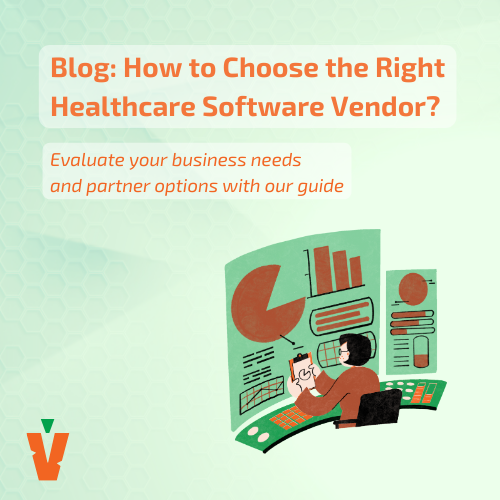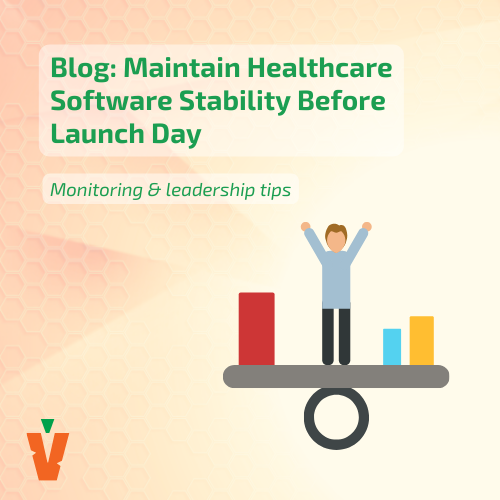In 2022, 93% of physicians agreed there’s at least some advantage in using digital tools for patient care. The numbers show a definitive rise in tech acceptance, and with that comes increased demand. As a healthcare SaaS company, you’re just the entity to offer such solutions — but can you do it alone?
Healthcare is an interconnected industry, with everything from payments to patients’ lives depending on a good information flow. For this reason, healthcare SaaS companies can’t operate in silos. That’s where software development consultants and partners come in handy.
In most cases, you can benefit from partnering with tech companies to build integrations, reach new markets, and achieve greater functionality. These partnerships are also the trump card in those sticky situations where your internal team lacks the resources or the know-how to make an idea come to life.
Consider this situation from Vitamin’s portfolio — the CEO (with an engineering degree) had an idea whose technical team deemed impossible. He decided to take the project outside of the company and test his hypothesis, and then Vitamin stepped in to prove it — with the success of launching a pharmacy management app for over 1500 locations. Such situations are living proof that working in silos only slows you down.
But we also have to acknowledge that having a partner is a dependency, and it’s not without drawbacks. So, join us to tally the advantages and disadvantages of such partnerships in healthcare software development and discuss ways to maximize the perks of your working relationship.
A Word on Types of Tech Partners
Vendors present themselves as a simple solution to your healthcare software problems. They can handle the entire development lifecycle from concept to deployment and maintenance. You get a quick solution without having to hire the necessary talent with highly specific expertise like Medicare Advantage or FHIR data standards. When it comes to drawbacks, you face the risk of a high TCO, security and compliance problems, and being dependent on an external third party.
Another issue of working with vendors comes from companies’ approach to the partnership. Oftentimes, businesses seek them out way too late, when they’ve been struggling with bugs for months, sometimes even a full year, and now it’s time to go live or get another round of funding. Onboarding a business partner at this stage is a super-stressful affair that often leads to wasted resources and not resolving the real issue. It’s better to start by consulting a company that has experience with projects such as yours, having their support throughout the SDLC.
But hindsight is 20/20, which is why another flavor of tech partner became prominent in the industry — one that’s with you from the get-go. The below table shows the three main types of these partners.
|
Recruiting partners |
Staffing an expert for a project (or longer-term) part-time or full-time. |
|
Outsourcing partners |
Outsourcing a team to lead the project part-time or full-time. |
|
Development consultant partners |
Delivering an outside opinion on tech-related matters and providing development services that solve business issues. |
The first two types can be useful if you’re understaffed, but they aren’t ideal. Think of the business model — they charge by the hour, so it makes sense to produce a more complicated solution that takes longer to deliver. The third type (Vitamin belongs to this category) doesn’t work with you to get engineering hours — they focus on capital-efficiency and seek the optimal way to resolve a business problem.
The Perks & Struggles of Keeping Development In-House
Healthcare SaaS companies can do wonders for the industry, but simple technology no longer cuts it. Modern healthcare workers require modern solutions that are secure, intuitive, and very interoperable. And these are harder to build, especially if you seek to do everything in-house.
What we often hear from clients is that most developers can code, but rarely any understand healthcare — and due to the demand, those that do often get swept up to do bigger and better things, leaving you without an in-house expert on these topics. We at Vitamin pride ourselves for having both types of knowledge. We transfer these skills to internal teams during collaboration, leaving you more independent and capable than you initially were.
Keeping up with the latest healthcare software advancements is the main challenge of having only an in-house development team. You’d need a team of internal experts on everything from data analytics to AR and VR, which is expensive and sometimes unsustainable. This means high costs of finding, training, and retaining talent and long development cycles, which can impair progress and financially challenge your company.
What about the benefits of working independently within your healthcare SaaS team and resources?
For one, you have control over the development process, from security to QA, with fewer dependencies and external stakeholders. Compliance is simpler if you don’t have to worry about the status of your partners, too. With time, you also develop a super-skilled team with deep expertise in your slice of the healthcare sector.
Benefits and Drawbacks of Healthcare Software Tech Partners
Sometimes, the in-house team doesn’t cut it. Drawing from our experience, look at Amplicare. The CEO had an idea, the developers said it was impossible, so they came to us. We at Vitamin are good at finding solutions or creating them, and our partnership yielded exceptional results — the resulting PMS launched in 1500 pharmacies within a year.
Specialist healthcare software development consultants are sometimes necessary to tackle modules or segments you’re not proficient with. For instance, AI-powered precision medicine requires a deep understanding of algorithms. While staffing is helpful if you’re pivoting to AI, it’s often more financially sound to collaborate with domain experts. Another issue is developing tech that meets the standards of Epic Systems — the leading EHR provider used by hospitals across the US. We got an Epic certification, which lets us work with healthcare providers who use this software and shows how committed we are to security.
Whether considering a healthcare software development consultant or vendor, balance the benefits with the risks. The details depend on the partner, but the table below offers a neat overview.
|
Benefits |
Drawbacks |
|
|
Recruiting partners |
Access to a wide talent pool |
Longer onboarding time |
|
Flexibility to hire part-time or full-time |
Higher cost per hire (recruitment fees) |
|
|
Can scale team quickly |
Less control over cultural fit |
|
|
Outsourcing partners |
Access to specialized skills |
Risk of quality issues |
|
Management by the external team |
Potential communication barriers |
|
|
Cost-effective compared to in-house |
Less control over the project’s progress |
|
|
Scalability to adjust team size based on project needs |
||
|
Consultancy partners |
Expert advice on tech-related and regulatory and compliance matters |
May require additional team members for execution |
|
Provide specialized development services |
Higher hourly rates for consultation |
|
|
Ability to leverage experience of engineers, QAs and BAs that are constantly exposed to various healthcare projects and issues vs. the internal ones who work on 1 challenge |
||
|
Flexibility to engage on a per-need basis |
||
|
Scalability to adjust team size based on project needs |
||
|
Can optimize existing plans, processes, and technologies |
Next, let’s examine ways your tech partner may team up with in-house developers to produce healthcare software. Examining the process is the best way to determine where they can help and where they fall short.
How Partners Can Collaborate With Internal Teams
In many healthcare organizations, internal tech teams face pressure to keep up with rapid advancements, regulatory changes, and the increasing demand for better patient care. They also struggle with the ever-growing, increasingly interconnected healthcare industry. To illustrate, we worked with Aventi, a 340B TPA that had to securely connect with multiple partners, from hospitals and pharmacies to wholesalers. Given the complexity of this challenge, partnering with specialized vendors was a practical and strategic choice — and as healthcare digitizes, this situation will only get more common.
Here’s how that may look if you’re building healthcare software with a vendor.
Typically, the internal team conducts a needs assessment to find gaps in their current system. Vendors, selected for their expertise and track record, step in and provide tech solutions as needed. The parties outline the scope, timelines, and deliverables together. Regular communication is maintained through status updates and progress reports to ensure alignment and create technically sound, user-centered solutions.
What about healthcare software development consultants?
When a healthcare organization partners with a tech company that offers software solutions and consultancy services, the collaboration begins with an in-depth Discovery Phase. The consultancy team analyzes your needs, workflows, and regulatory environment.
Based on the findings, the consultancy team works with your in-house team to develop a strategic roadmap. It outlines the project’s objectives, scope, timelines, and compliance. Once the strategy’s in place, the partner’s devs take over technical implementation, working with your tech team to develop and deploy the software.
The Vitamin Software Approach to Tech Partnerships
We at Vitamin Software are healthcare software development consultants and solutions partners. You can learn more about it by visiting our services page, but here’s the gist of our approach:
- Stuck on a business issue you have no idea how to solve? Let one of our Business Analysts have their hand at it. Our experience and the Vitamin Sanity Check ensure you have the most viable, capital-efficient tech approach that solves real-world healthcare problems. For instance, a health tech client struggled to create an app on time, so we suggested reducing the scope to help them meet their deadline and maintain momentum.
- Struggling to develop an entire project on schedule? Our work can encompass the whole app or platform (and we have some of that cooking), but we often support other healthcare SaaS companies. We could build parts of a project to speed things up and help you meet your promises to stakeholders.
- Not sure where to source tech expertise on tasks like the FHIR standard? We don’t outsource our engineers, but we respect your autonomy and tech ownership. We could partner with your in-house team to introduce additional brainpower and help you get where you need to be. In this case, there’s a clear division of tasks so nobody’s stepping on anybody’s toes.
Final Verdict & Next Steps
Healthcare software development consultants can be an invaluable resource, if you approach them right. Do your homework before hiring somebody, and define what you need from them as clearly as possible. Be honest about the abilities of your internal team and know that supplementing your team isn’t a show of weakness but understanding your own capacities and business decision-making.
If you decide that partnership is the way to go, don’t settle for the lowest bidder. Here’s a pro tip before we send you back to your tasks — the difference between professional partners that promise good outcomes and those who don’t is that the former have the problem and solution defined in a SMART format when they offer their services. It’s an easy way to differentiate between companies that mean business and those seeking a long contract full of tasks that may or may not help you launch.
At Vitamin, we partner with healthcare software companies for consultancy or development. We enter time-bound, specific agreements that clearly define our responsibilities — and we’re happy to maintain ongoing partnerships if things get off on the right foot. Schedule a consultation if our service model sounds like something you might benefit from, and we’ll chat about the details.




